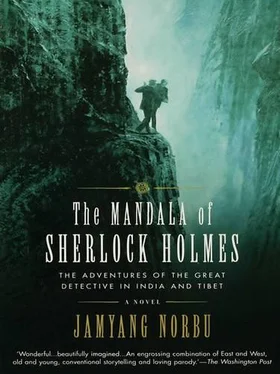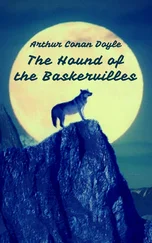'By thunder! Where's that staircase?'
'The sweeper says it is at the end of the corridor, Sir, and that it leads down to the trade entrance.'
Holmes ran through the corridor and down the narrow staircase, leaving me no alternative but to follow him. We came out in a rush through the back door into a narrow alley. But obviously our prey had flown, for there, about a hundred yards ahead of us, an ecca ghari rattled furiously down the dark empty lane. As the ghari turned the corner into the main street, it came for a moment under a street lamp. The occupant happened to rise in his seat just then and turn around to look back. It was the ferret-face!
'I fear we are a trifle late,' observed Mr Sherlock Holmes, slipping a large revolver back into his coat pocket. 'You did not, by any chance, observe the licence number of the carriage?'
'No, Sir, but I did see something else.' I told him about ferret-face as we climbed back upstairs.
'Quite so, quite so. He was probably a confederate,' he remarked as we reached the corridor. 'I should have anticipated something like this. Why hullo, here's Strickland. The police force must have arrived.'
'Mr Holmes, have you discovered anything?' enquired Strickland eagerly.
'I could only make a cursory inspection of the scene of the crime, before my attention was diverted by another incident.' Sherlock Holmes proceeded to tell Strickland of the old bhangi's tale and our fleeting encounter with the mysterious ferret-face. 'So now with your permission, I will commence my examination.'
As he spoke, he whipped out a powerful lens and a tape measure from his pocket. With these two implements he moved noiselessly about the corridor, sometimes stopping, occasionally kneeling and once lying flat on his face. He stopped at one point and beckoned to Strickland and me. 'What do you make out of this?' he asked, pointing to something on the floor.
'It looks like a large clot of blood,' Strickland replied.
'Mmm… a possibility; still, if you could lend me a handkerchief.'
I proffered mine. He took it and wiped the red lump of blood with it. Underneath it was grey.
'Why, it is a piece of India-rubber,' I exclaimed.
'You think so?' Holmes remarked. 'Well, I think that's all that can be got here. Let us now proceed further.'
Holmes entered the Room 289 and there devoted himself for fifteen minutes to one of those laborious investigations which form the solid basis of his brilliant successes. It was a memorable experience for me, to view, first hand, the actual modus operandi of a man whose incomparable achievements were famous throughout the world. The look of keen interest on Strickland's face showed that his feelings were much the same as mine. At the time I could not help but be slightly amused at the way Mr Holmes muttered away to himself under his breath the whole time, keeping up a running fire of exclamations and whistles suggestive of encouragement and hope, and the occasional groan or sigh which probably indicated otherwise.
Near the large bed he stopped and exclaimed, pointing at the floor. 'Well, well. What do we have here?'
'It looks like marks left by the legs of a chair,' suggested Strickland.
'Table, my dear Strickland, definitely a table. The impressions are too wide apart for a chair. The table is not normally placed here, for the impressions would be appreciably deeper and there would be a slight difference in colour from the surrounding carpet. Also the table was removed from this position only a short time ago. Observe the tufts of carpet-pile slowly springing back into place.' He straightened up and looked around the room. 'And there we have the very article.'
'But there's another one just like it on the other side of the room,' I interjected.
'Ah. But the probability of this one being the right table is higher. It is just a matter of convenience. One normally uses what is closer at hand.' He walked over to the table and inspected it. CI perceive I am correct. Observe these heavy scratches on the varnish. Dear me, what a way to treat such a fine piece of furniture. Obviously someone has stood on the top of this table. Someone wearing heavy boots. Humm. Now let's see how we can fit it all together. Could you lend me a hand here?'
Mr Holmes and I lifted the table over to the bed and set it down carefully so that the base of the legs matched the indentations on the carpet.
'A perfect fit, Mr Holmes,' said I, in satisfaction. But Sherlock Holmes was already on the table and reaching out for a brass lamp of native manufacture that hung on a thin chain over the bed. The lamp, of Benaras metalwork, was wrought in the shape of a richly caparisoned elephant. Handling it gingerly with a handkerchief, he examined it closely with his lens. Finally, after about ten minutes, he let the lamp swing back over the bed, and hopped off the table.
'Ingenious. Sheer devilish ingenuity I should not have expected less…'He scrutinised the counterpane on the bed with his lens. 'Now logically there should be… Ah! Just as I expected.' With the aid of a small penknife he scraped away some brown particles from the cloth and held it up to the gas light for examination.
'It is definitely sealing-wax. Do you not think so, gentlemen?'
'Holmes,' Strickland cried impatiendy, 'is there a connection between all this and the dead man? Was the man murdered, and if so, how? And why the tremendous bleeding? I really think you might treat us with more frankness.'
'In all my experience I cannot recall a more singular and interesting study. My investigations are nearly complete, but I must verify a few more details before I can announce my results to you. I assure you, however, that I will only hold back the answers for the shortest possible period. In the meantime, I think you ought to know that our unfortunate dead man downstairs is a victim of both murder and accident.'
'You speak in paradoxes, Sir,' I interjected.
'You're making fools of us, Mr Holmes,' Strickland said angrily.
'Tut, tut, Mr Strickland. Thefirst sign of choler I have detected in you. Still, it is my own fault. I should have made it clear.'
'Clear, Mr Holmes? We do not even know who the dead man is.
'The dead man was a native servant of this hotel. He was without doubt murdered. But his death was an accident, in the sense that he unfortunately placed himself in a situation where the real victim should have been instead.'
'Then who was the murderer really after?'
'None other than myself, I should imagine.'
'You, Mr Holmes?'
'Oh, I must admit to a certain notoriety in criminal circles,' Holmes chuckled, 'but it's a long story and…'
A vague memory that had been bothering me for the last few minutes now suddenly sprang crystal-clear in my mind. 'The boat, Mr Holmes,' I cried.
'Well, what about it?' said Strickland irritably.
'The Kohinoor should have docked at least by midday, instead of which it could only do so late in the afternoon. If everything had gone according to schedule, Mr Holmes not only would have been in this hotel by the evening, but could have been in his room, maybe even this one, at the time of the incident.'
'And Mr Holmes would then have been the unfortunate victim instead of the other fellow?' asked Strickland.
'Possibly,' said Sherlock Holmes softly.'Only possibly. I assure you gentlemen, that I am not boasting of undue prescience when I say that I was anticipating an attack upon my person. I have had four such attempts made on me just this month, though I must admit that this particular one presents the most features of interest.'
'But the room,' Strickland exclaimed.'How could the murderer have known that…?'
At that moment a dour looking police officer in khaki drill walked into the room. He tugged at his ragged grey moustache worriedly as he spoke.
Читать дальше












